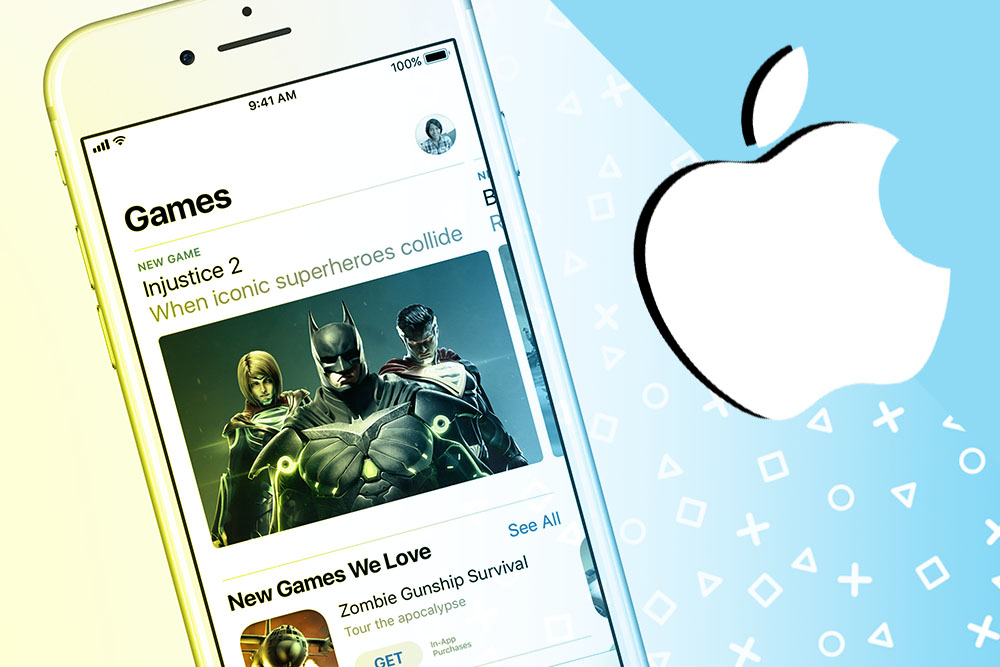Despite some efforts from developers, Apple isn’t exactly known for being a game platform—at least not on desktop or AppleTV. But on mobile devices, the world’s most valuable portfolio is embracing its active (and high spending) audience of gamers with a new App Store design, subscription services and an expansion into AR/VR.
Playing To The Crowd
Gaming is the most popular category on the App Store, according to the company, and with the latest update, Apple makes it easier to find something to play. With a dedicated home just for games, the new App Store layout features recommendations for new releases and updates, videos, top game charts and “hand-picked” collections.
Apple has good reason to keep mobile gamers happy—iOS users spend twice as much on mobile games than on Android, according to a study by AppsFlyer. The average purchase of gaming apps is at $12.77 for iOS versus $6.19 for Android. Mobile gaming is the largest sector in interactive entertainment and consumers spent a whopping $41 billion on mobile games last year.
“Apple is currently the clear leader in mobile gaming with a forecasted total earnings of $28 billion in 2017E,” Superdata CEO Joost Van Dreunen told AlistDaily. “However, over the years, Android has been catching up and is expected to total $20 billion this year. Given this circumstance, it is clear that Apple has to start clearly differentiating itself.”
Sign Me Up
Rolled out last fall, Apple is encouraging developers to adopt its new subscription model by offering them 85 percent of the revenue for all users who stay subscribed for longer than a year.
“[IOS] subscriptions benefit developers from a revenue standpoint given a higher revenue share with the app stores, potential promotion of customer loyalty and revenue predictability,” Terence Fung, Storm8 chief strategy officer told AlistDaily. “For 2017, I expect developers to launch games with fresh game mechanics and/or episodic content that’s highly valued by consumers and are much better tailored for subscriptions. By the end of 2017, there will be a new top 50 grossing game that garners more than 50 percent of its revenue from subscriptions.”
Gaming Into The Future
AR/VR has become a major focus for Apple, as demonstrated during the company’s 2017 Worldwide Developer Conference (WWDC 17). Powered by Epic Games’ Unreal Engine 4 (UE4) technology, Industrial Light & Magic (ILM) showcased its HTC Vive real-time cinematic demo which ran on Macs for the first time. Director Peter Jackson’s company, Wingnut AR, also took the stage to give a preview of what AR gaming could look like using an iPad Pro and a tabletop.
On stage at WWDC, Nick Whiting, technical director of VR and AR at Epic Games, said that Niantic helped pave the way for Apple’s move into AR with Pokémon GO.
“Pokémon GO brought the whole idea into the mainstream, so you don’t have to convince people to buy a device,” Whiting said. “The barrier to entry is zero. A social experience can only work when a critical mass of people you know in real life have a frictionless entry point, and that’s the case with iPhone and not the case with any other platform in the world.”
Apple caught the attention of developers and gamers alike by partnering with Nintendo last year for both mobile devices and the Apple Watch.
“Already we saw a timed platform exclusive release with Super Mario Run last year, which had the markings of a test to see how much Apple should invest in original content,” Van Dreunen continued. “So far, Apple TV hasn’t done much as a gaming console, and despite a growing inventory of games on its App Store, its laptops and iMacs are by no means considered ‘gaming computers.’ It is likely that Apple will regard augmented reality as the next frontier where it can set itself up for a first-mover advantage. Since WWDC 17, the company has been on a road tour to recruit content creators, which suggests that we might have a few interesting years ahead of us.”
“Business models, marketing mechanics, and organizational structures required to run apps/games as a service have been pioneered through Apple’s mobile devices,” Newzoo CEO Peter Warman told AlistDaily. “During this process, hardware revenues have always been the main focus of Apple. Now that unit sales are dropping due to a longer lifetime of smartphones and tablets, Apple will need to revisit who they are and what else they can offer to consumers.
“Naturally this includes more peripherals, for example, voice control devices and VR headsets, but will it play a more significant role in (interactive) content? With gaming fast becoming the world’s favorite pastime, it’s only natural to put “game enthusiasts” at a central position in any interactive media strategy that Apple develops. Apple can play a more active role in providing consumers with the tools to create communities, content, and their own business.”

